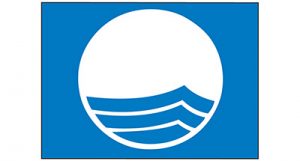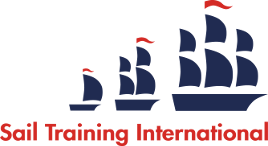The Environment and Blue Flag
We want to make sure that we’re all doing our bit to protect our environment and keep our seas clean.
Our aim is to work with young people, vessels and ports to make sail training and our events as green, sustainable and positive as possible. Let’s take a look at how we do this.
As you might have guessed, Tall Ships, the Tall Ships Races and Regattas, and sailing itself are naturally environmentally friendly. Although vessels do need to use engines at times, there aren’t any emissions during sailing because they harness the power of the wind to move. Some also generate their own electricity on board with solar panels and wind generators.
Many Tall Ships owners and operators prioritise using green ship-building skills. Lots of these new vessels use green technologies, and everyone on board is focused on sustainability.

At Sail On Board, we think that sustainability is a bit of a no-brainer. It’s about not being harmful to the environment or using up natural resources. So, we want to make this our priority.
We do our bit for the environment by:
- Supporting vessels with advice and examples of new green technologies. Check out the Living Ship initiative for more information.
- Supporting and encouraging sail training vessels to participate in (and help to develop) sustainability education. The Swedish Tall Ship Tre Kronor is a great example.
- Supporting the Sail Training International Youth Council. It has representatives from 22 countries, and promotes sustainable behaviour and environmental awareness amongst young people.
- Delivering a range of sessions at the annual International Sail Training and Tall Ships Conferece.
Our Races and Regattas visit ports around the world. Of course, we want to make sure that they are also as green as possible. We do this by:
- Endorsing host ports who sign up to a sustainable event management standard or “green port” initiatives. The only thing we want to leave behind is smiles on the faces of trainees and visitors.
- Presenting an Environmental Award in ports during a Race or Regatta. This recognises the vessel that has demonstrated best environmental practice during the event.
- Encouraging adequate recycling and waste disposal schemes.
You might have heard of the Blue Flag Scheme. Perhaps your local beach proudly displays its flag? It means that somewhere is environmentally friendly. We think it’s important that Tall Ships can say the same.
The Blue Flag Scheme was introduced by the Foundation for Environmental Education (FEE) to promote clean beaches and marinas. In 2011, Sail Training International worked with the FEE to extend the scheme to include sail training vessels. For sail training vessels, the Blue Flag shows everyone that they have pledged to protect the seas they sail on.
The scheme is open to members of National Sail Training Organisations (NSTOs), the Sail Training International Ships Council, members of the Sail Training International Ships Council, and other vessels that participate in the Tall Ships Races and Regattas. We’re pleased to say that 53 vessels have signed up to-date and we are actively encouraging more to get involved.
Once signed up, we present the awarded vessels with the Blue Flag to fly, a membership certificate, and an educational poster for display in trainee crew quarters.
The Blue Flag application process is under review with the Foundation for Environmental Education (FEE). The goal is to have an updated application process in place by the middle of 2023.
If you are involved with a sail training vessel and would like to learn more about the Blue Flag scheme, you can register your interest by dropping an email to blue.flag@sailtraininginternational.org.
When vessels join the Blue Flag Scheme, they agree to do the following:
- Not throw anything overboard, at sea or in port.
- Not release “black water” (sewage) into the sea near coastal water or sensitive areas.
- Use and promote recycling facilities.
- Not buy or use objects from protected species, or from archaeological underwater findings.
- Report any pollution or environmental violations.
- Protect animals and plants, and not engage in forbidden fishing.
- Respect vulnerable and protected areas.
- Encourage other sailors to take care of the environment.
Check out the full Code of Conduct.
If you’d like to sail on a Blue Flag awarded vessel, look out for the logo displayed on their page.


